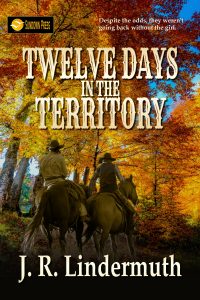Today’s guest is J.R. Lindermuth. He lives and writes in a ho use built by a man who rode with Buffalo Bill Cody. A retired newspaper editor, he is now librarian of his county historical society where he assists patrons with genealogy and research. He has published 19 novels and two non-fiction regional histories. He is a member of International Thriller Writers and a past vice president of the Short Mystery Fiction Society.
use built by a man who rode with Buffalo Bill Cody. A retired newspaper editor, he is now librarian of his county historical society where he assists patrons with genealogy and research. He has published 19 novels and two non-fiction regional histories. He is a member of International Thriller Writers and a past vice president of the Short Mystery Fiction Society.
So, you can see, he is a perfect person to tackle the dichotomy of fiction and reality.
Facts are important if you’re going to write fiction.
Isn’t that a contradiction, you might ask. Not at all. Fiction is a simulation of reality. If you incorrectly present something in fiction a reader knows to be a fact you may be called out for your error or even lose that reader.
When you’re writing a story you can rely on imagination and create a world to suit your purpose. That’s called fantasy. J.R.R. Tolkien did it to the delight of his readers. So does George R. R. Martin. If the reader understands that’s your intention, it will be accepted without question. While Martin’s work is replete with dragons and magick, it’s also solidly grounded in ‘realism’ through his employment of psychology in depicting his characters and knowledge of medieval society.
This attention to facts is even more important if you’re writing about an actual time and place. You can twist things a bit to suit your purpose–that’s called fiction–so long as your reader is willing to accept your diversion from fact. For instance, if you’re writing a western your reader will accept having a character ride a horse or even a mule. Expect a frown if you seat this same character on a unicorn; that would be fantasy.
So, what can you do to help stick to reality when writing fiction? There are two tools that work well. One is called empathy. The other is research.
Empathy is vicariously experiencing the emotion, thought, or action of another person. This is a useful tool for a writer in many circumstances. However, it has its limits. Some characteristics are timeless. But if you live in the 21st century and you’re writing about the 19th century how can you be sure of depicting things accurately?
That’s where research comes in. No one has yet developed a time machine which would allow us to visit other periods and see what life was like then. We do have some good substitutes, though, which can provide an idea of what life was like in other periods.
Reading biographies, journals, histories and even fiction of the time can offer some insight. Even better choices for learning are newspapers and magazines of the period. Such journals reflect the character of the times in which they’re created; they show us what was important to people, their pastimes, their morals, their prejudices. They can give you everything you need to create believable characters of the time you’re writing about.
These valuable materials are available in collections at historical societies, in many libraries and even on line. Librarians are good at telling us where to find newspapers to suit our needs. Reading them is fun and sure to stimulate your imagination.
Such sources have been important to me in writing historical fiction. They were especially important in writing my latest, Twelve Days in the Territory, which is set in 1887 in Indian Territory (present-day Oklahoma), an area I’ve never visited. I was especially pleased when my editor, a native of the state, praised my attention to detail and efforts to ‘get it right’ about the territory in those times.
Here’s a blurb for Twelve Days in the Territory:
Will Burrows, a mild-mannered school teacher, is the only man in town who volunteers to join Sheriff Gillette in pursuit of outlaws who have taken Martha Raker, the sheriff’s niece, hostage and fled into Indian Territory in the fall of 1887.
Gillette doubts Will’s suitability for the task, but the young man who has been courting Martha insists he must go. Yet even Will has doubts about his qualifications and harbors a secret which raises his fears of what they’ll face in the Territory.
Martha, a strong-willed young woman, will show courage and tenacity in the will to survive, confident in the belief she will not be abandoned by the man she loves or by her uncle.
All three will face trials the like of which they’ve never known before and they soon discover Crawford McKinney, the outlaw holding Martha is the least of their troubles.
……..
If this sounds as interesting to you as it does to me, you can take a closer look at
I can recommend it.


 tragic-comic bubble and squeak.” —William Harrison Ainsworth, New Monthly Magazine, review of Moby Dick by Herman Melville (1851)
tragic-comic bubble and squeak.” —William Harrison Ainsworth, New Monthly Magazine, review of Moby Dick by Herman Melville (1851) main speaker at a writers conference. But after the opening session and in front of a crowd, Maggie DeLuca, Father Frank’s sister, accuses Granet of stealing her story and says he will pay.
main speaker at a writers conference. But after the opening session and in front of a crowd, Maggie DeLuca, Father Frank’s sister, accuses Granet of stealing her story and says he will pay. has a number of mysteries published, including a four-book series centered around a cat who can actually solve crimes, and a three book series set during World War II. She’s multi-published in magazines and over twenty anthologies. But today she’s telling us a little about her latest mystery, The Spirit Woman of Lockleer Mountain. It weaves together mysteries about a secret government installation, a missing sister who may have amnesia, drug sales to teenagers, and sightings a illusive woman in a flowing green dress with a mountain lion, who just might be the legendary Native American Spirit Women.
has a number of mysteries published, including a four-book series centered around a cat who can actually solve crimes, and a three book series set during World War II. She’s multi-published in magazines and over twenty anthologies. But today she’s telling us a little about her latest mystery, The Spirit Woman of Lockleer Mountain. It weaves together mysteries about a secret government installation, a missing sister who may have amnesia, drug sales to teenagers, and sightings a illusive woman in a flowing green dress with a mountain lion, who just might be the legendary Native American Spirit Women. Unfortunately, I fear if I should ever be fortunate enough to find myself on that much discussed elevator, in spite of good intentions and hours of practice, I expect the conversation would more likely go something like this.
Unfortunately, I fear if I should ever be fortunate enough to find myself on that much discussed elevator, in spite of good intentions and hours of practice, I expect the conversation would more likely go something like this. This came to me through various routes, so I cannot give credit to the author. But I’m sure the author will be happy to see it passed to others. And writers should most certainly take it to heart. I’d be happy to hear your thoughts on this so leave a comment by clicking on the bubble at the top. And thanks for visiting the author’s blog.
This came to me through various routes, so I cannot give credit to the author. But I’m sure the author will be happy to see it passed to others. And writers should most certainly take it to heart. I’d be happy to hear your thoughts on this so leave a comment by clicking on the bubble at the top. And thanks for visiting the author’s blog. complicated. A horse named Trouble pawed the ground, snorted, and would have bitten me had I not been considerably quicker than I am now. A second horse, Lightning, slept through the interview, barely managing to put two feet ahead of the other two. He failed to make the cut. The next candidate, Cara, passed with flying colors—until price entered the picture. Grace, a lovely sorrel, had two—no, make that four—left feet.
complicated. A horse named Trouble pawed the ground, snorted, and would have bitten me had I not been considerably quicker than I am now. A second horse, Lightning, slept through the interview, barely managing to put two feet ahead of the other two. He failed to make the cut. The next candidate, Cara, passed with flying colors—until price entered the picture. Grace, a lovely sorrel, had two—no, make that four—left feet. The children were nestled all snug in their beds, with visions of sugar plums dancing in their heads. I slipped out, sneaked down a quarter mile to the neighbor’s house, and on tip-toes, lead Cheyenne to our place, and tied him securely to a bush outside the front of the house.
The children were nestled all snug in their beds, with visions of sugar plums dancing in their heads. I slipped out, sneaked down a quarter mile to the neighbor’s house, and on tip-toes, lead Cheyenne to our place, and tied him securely to a bush outside the front of the house.
 The woman ran to her children, shielding them from scoundrel me, questioning them as to what I had done. The man, his Paul Bunyan legs requiring few steps to traverse the distance, grilled me. I quickly recognized he was a seven foot interrogator for the CIA.
The woman ran to her children, shielding them from scoundrel me, questioning them as to what I had done. The man, his Paul Bunyan legs requiring few steps to traverse the distance, grilled me. I quickly recognized he was a seven foot interrogator for the CIA. Needless to say, when I once more enticed my children outside to meet Cheyenne, Christmas became a lot brighter. He was an instant star, and continued to be their favorite even when, a year later, a younger, more beautiful buckskin named Major joined Cheyenne in the family circus.
Needless to say, when I once more enticed my children outside to meet Cheyenne, Christmas became a lot brighter. He was an instant star, and continued to be their favorite even when, a year later, a younger, more beautiful buckskin named Major joined Cheyenne in the family circus.


